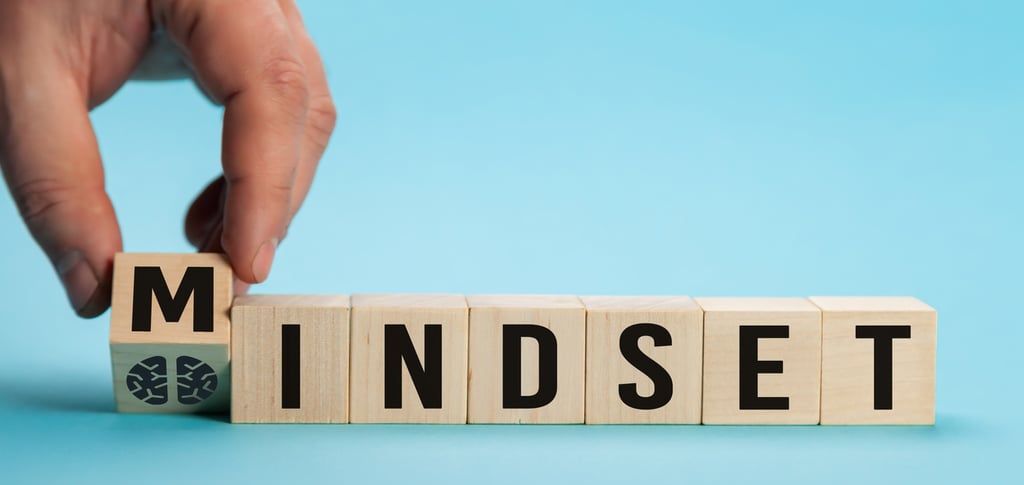The Subtle Art of Not Giving a F*ck: A Mindset Shift for Recovery and Mental Health
Inspired by the book The Subtle Art of Not Giving a F*ck written by Mark Manson and published in 2016. This bestselling self-help book challenges the traditional notion of positivity by emphasizing that we have limited energy and attention, so we should be intentional about what we actually care about. This mindset shift is not about being indifferent. It’s about choosing where to invest your energy, setting boundaries, and prioritizing what truly matters.
All In Health
4/30/20256 min read


The Subtle Art of Not Giving a F*ck: A Mindset Shift for Recovery and Mental Health
In a world where we’re constantly bombarded with expectations—be more successful, be more liked, be happier—it’s easy to feel overwhelmed. Many people spend their lives worrying about things they can’t control, seeking validation from others, and overextending themselves for fear of disappointing people. But what if the key to peace, resilience, and long-term recovery wasn’t about caring more? What if it was about caring more selectively?
Inspired by the book The Subtle Art of Not Giving a Fck* written by Mark Manson and published in 2016. This bestselling self-help book challenges the traditional notion of positivity by emphasizing that we have limited energy and attention, so we should be intentional about what we actually care about. This mindset shift is not about being indifferent. It’s about choosing where to invest your energy, setting boundaries, and prioritizing what truly matters.
What It Means to “Not Give a F*ck” (The Right Way)
Many people hear the phrase and assume it means apathy or recklessness. That’s not the case. In the context of recovery and mental health, learning to “not give a f*ck” means learning to let go of what doesn’t serve you and focus on what truly deserves your energy.
Here’s how this mindset shift applies to real life:
1. Letting Go of What You Can’t Control
One of the biggest sources of stress in life comes from trying to control things that are outside of our power—how others feel about us, the past, the future, or whether people understand our journey.
In recovery, it’s common to struggle with:
Regret over past mistakes
Worry about how others perceive you
Guilt about setting boundaries with people who may not understand
Frustration with those who refuse to change or support your growth
But the truth is, you can only control yourself—your actions, your choices, and how you respond to challenges. The moment you stop investing energy into things you cannot change, you free yourself from unnecessary emotional burdens.
Ask yourself:
Is this situation within my control?
Am I wasting energy on something I have no power over?
Would I be better off accepting it and focusing on what I can do?
This doesn’t mean you stop caring—it means you redirect your energy to what actually matters.
2. Prioritizing What Actually Matters
Not everything deserves your time, energy, or stress. Yet, so many people spend more time worrying about what others think than about their own well-being.
When you are in recovery or working on your mental health, it’s easy to fall into the trap of:
Feeling obligated to explain yourself to people who don’t support you
Trying to fix relationships that are toxic or unsupportive
Overcommitting to things that drain you, just to “keep the peace”
Instead of spreading yourself thin, shift your mindset to focus on what truly matters to you.
Ask yourself:
Will this matter in a year?
Does this contribute to my recovery and well-being?
Is this draining my energy more than it’s helping?
When you learn to prioritize your peace, growth, and well-being, you free yourself from the burden of unnecessary stress.
3. Breaking Free from External Validation
Many people unknowingly live their lives based on other people’s expectations rather than their own values. This is especially common in recovery, where individuals may:
Seek approval from family members who don’t fully understand addiction
Worry about judgment from old friends or society
Feel pressure to meet unrealistic standards of success
But if your self-worth is tied to outside approval, you will never feel truly secure.
The goal is to shift from seeking validation from others to finding fulfillment within yourself.
How to break free from external validation:
Define success on your own terms – What does a fulfilling life mean to YOU?
Practice self-acceptance – You don’t need permission to be yourself.
Let go of unrealistic expectations – The people who truly matter will support your growth, not demand perfection.
When you stop caring about how others perceive you and focus on being true to yourself, you become stronger, more resilient, and more confident in your journey.
4. Accepting Discomfort as Part of Growth
Many people try to avoid pain and discomfort at all costs, but growth doesn’t happen in comfort zones. Recovery, healing, and personal development all require us to face difficult emotions, process past experiences, and push through challenges.
Some things will feel uncomfortable, including:
Saying no to people who are used to you saying yes
Facing emotional pain without numbing it
Challenging old habits and thought patterns
Being patient with your progress instead of expecting instant change
But instead of avoiding discomfort, embrace it as a sign of growth.
When you learn to sit with discomfort rather than run from it, you become stronger, more self-aware, and more resilient.


How This Mindset Helps in Recovery, Mental Health and relationship?
1. It Reduces Anxiety and Overthinking
By letting go of what you can’t control and focusing on what actually matters, you eliminate unnecessary stress and mental exhaustion.
2. It Strengthens Boundaries
You learn that protecting your peace is more important than pleasing others, allowing you to say no without guilt.
3. It Empowers You to Make Decisions for Yourself
You stop living for the expectations of others and start prioritizing your own well-being.
4. It Helps You Stay Committed
When you focus on your own goals instead of outside validation, you build lasting motivation for change.
How to Apply This in Your Life
1. Identify What Actually Matters
What are my core values?
What do I truly care about?
What am I wasting energy on that doesn’t serve me?
2. Choose Your Battles Wisely
Not every situation requires a reaction. If something doesn’t truly affect your recovery or mental well-being, ask yourself: Do I need to give a f*ck about this?
3. Accept That Not Everyone Will Understand
You may outgrow relationships, disappoint people, or make choices others don’t agree with. That’s okay. Your healing isn’t about making everyone else comfortable.
4. Practice Detachment from Unnecessary Drama
If something drains your energy without benefiting your growth—whether it’s toxic people, social media, or negative self-talk—distance yourself from it.
Own Your Recovery, Own Your Life
Not giving a f*ck isn’t about apathy—it’s about intentionality. It’s about focusing on what truly matters while letting go of the rest.
Ask yourself:
Am I living my life for myself or for others?
Is this stress serving me, or is it just weighing me down?
What would happen if I stopped caring about things that don’t truly matter?
When you stop wasting energy on things that don’t deserve it, you gain more power to invest in what actually makes your life better—your recovery, your peace, and your happiness.


Exercises & Journal Prompts for Shifting Your Mindset
Here are some exercises that will help you clarify what truly matters, set better boundaries, and free yourself from unnecessary stress.
Exercise 1: The “Do I Really Care?” Filter
Often, we stress over things that don’t actually impact our happiness or growth. This exercise helps you recognize what deserves your energy.
Instructions:
Write down five things that are currently causing you stress or anxiety.
For each one, ask yourself:
Is this something I can control?
Will this matter a year from now?
Does this align with my values and goals?
Circle the one or two things that actually deserve your attention. Cross out the rest.
Reflect: How would it feel to let go of the things you crossed out?
Exercise 2: Identifying Your Core Values
If you don’t define what truly matters to you, society, family, or past habits will do it for you.
Instructions:
Write down your top five values in life (examples: honesty, growth, relationships, peace, independence).
For each value, list one action you can take to prioritize it in your daily life.
Ask yourself:
Am I living in alignment with these values?
What things am I giving energy to that don’t support these values?
Commit to one small change that shifts your focus toward what matters most.
Exercise 3: The “No More F*cks to Give” List
Sometimes, we hold onto things that drain us—guilt, toxic relationships, or unnecessary obligations.
Instructions:
Write down three things you are currently overthinking or stressing about.
For each one, answer:
Why does this bother me?
What would happen if I let it go?
What’s stopping me from moving on?
Create a mantra that reminds you to let go (example: I release what no longer serves me).
Journal Prompts for Deeper Reflection
What is one thing I’ve been caring too much about that I want to release?
What areas of my life do I need to set stronger boundaries in?
How does worrying about others' opinions hold me back?
What is one way I can start living for myself instead of for external validation?
How can I remind myself that I don’t need to control everything?
Final Thought
When you free yourself from unnecessary stress, you gain more energy to focus on what truly matters.
Which of these exercises felt most impactful for you? Would you like to dive deeper into a specific area?
GET STARTED TODAY
Your journey. Our commitment. Together, we’re all in.
STAY IN TOUCH
Contact Us
954-445-1567
© 2024. All rights reserved.
Contact Us
